Eyes and Vision
Rain Goggles For The Motorist
I'm surprised someone isn't selling a battery-operated version of these today as a gag gift. Wouldn't even need to be for motorists. Perfect for anyone out for a stroll in the rain.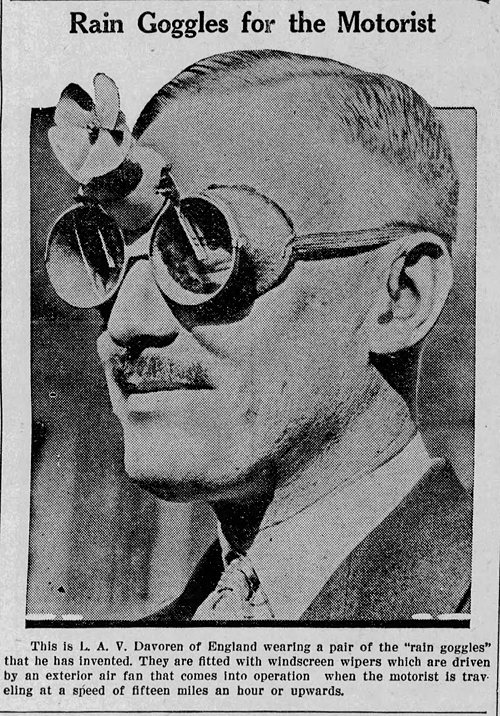
The Oklahoma Freedom Call - Feb 8, 1934
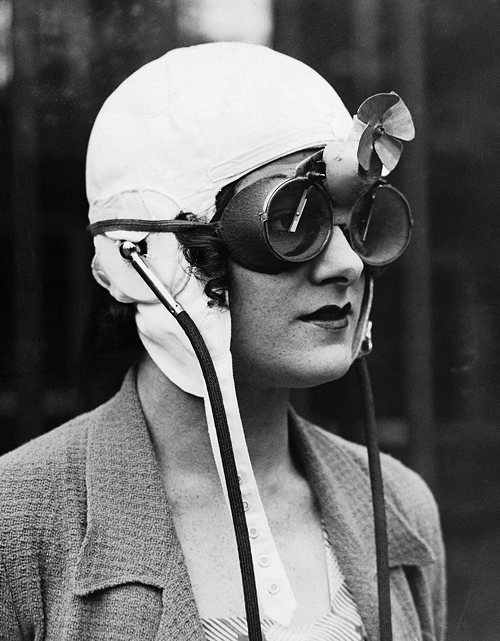
"Miss Paddie Naismith, noted English racing chauffeur, is shown wearing the very latest in motor modes, rain goggles, with wipers 'n' everything. A small fan, you can see it over the bridge of the nose, operates the wipers when the car is travelling at speeds in excess of 15 M.P.H. Its inventor is L.A.V. Davoren of London." — International News Photo, Oct 1933
image source: reddit
Posted By: Alex - Tue Dec 07, 2021 -
Comments (3)
Category: Inventions, 1930s, Weather, Eyes and Vision, Cars
Swindle’s Ghost
'Swindle's Ghost' is a term for an optical illusion that some psychologists have offered as a possible scientific explanation for ghost sightings. Actually, I doubt that many sightings are a result of this phenomenon, but I like the name.Newsday Special Correspondent Paul Brock (May 15, 1967) offered this explanation:
It can be summoned up by anybody. Using no more ectoplasm than a table lamp, friends can join you in this weird experiment, right in your own living room. Choose a dark moonless night and draw the drapes securely so that no stray light from street lamps or passing cars enters the room. Group the chairs near a table or floor lamp with one person directly alongside it to switch it on and off.
First, everyone must remain in the darkened room for at least 10 minutes before the experiment begins, so that the eyes can adjust completely to the darkness. Then, each ghosthunter must look steadily toward the lamp but not directly at it. They must keep perfectly still and keep the eyes from moving during the time the room will be illuminated and immediately afterward.
Now turn on the lamp for a full second. Turn it off. Shortly after you will see the whole scene loom up in the darkness with startling clarity, and the ghost impression will last for some time. Not only will everything appear exactly as it was when the light was on, but many precise details will be evident which could not possibly have been noted during the brief illumination...
The same optical illusion occurs when someone reports that he has seen a ghost in a graveyard at night. If a man is passing a graveyard at night and the moon breaks through the clouds just as he is opposite a white tombstone, in a few minutes he might see a vague white form loom up before him. The moon's illumination has created the 'ghost' which the man actually does see, but which is only an after-image— in the image of "Swindle's Ghost."
Some more info in the book Systems Theories and A Priori Aspects of Perception:
You can find Swindle's original article here:
Swindle, P.F. (1916). Positive Afterimages of long duration. American Journal of Psychology, 27, 325-334.
Posted By: Alex - Tue Jun 15, 2021 -
Comments (0)
Category: Paranormal, Supernatural, Occult, Paranormal, Psychology, Eyes and Vision
An Experiment on Eye Process
From The Art and Science of Embalming (1896) by Carl Barnes.The illustration shows an experiment by the embalmer W.W. Harris to test the efficacy of injecting embalming fluid through needles inserted at the corners of the eyes. Harris showed that the fluid would come out the veins and arteries in the neck— and if the head were still attached to a body, would then presumably spread throughout the rest of the corpse.

Posted By: Alex - Sun Jun 06, 2021 -
Comments (2)
Category: Death, Experiments, Eyes and Vision
Why the man of the future may have only one eye
1927: Scientist W.E. Bailey predicted that, in the far future, our descendants may have only "one large, central, cyclopean eye".Of course, who knows what humans may look like in a million years (if there are even any of us still around), but his argument sounds plausible enough to me (with my limited knowledge of neuroscience). Basically he argued that, over the past several million years, our brains have devoted more space to speech, and less to vision. Extrapolating that trend into the future, he concluded that the eventual merging of our eyes into one would be a more efficient use of the brain's resources, and so will probably happen.

Minneapolis Star Tribune - Dec 4, 1927
"Man's field of view," writes Mr. Bailey, "will become smaller and smaller. This, because his need of a wide field is growing less and less. This I say with full realization that we live in an age of automobiles, and that these vehicles render desirable a wide field of view. The automobile is probably a very transitory phenomenon. I even believe that, in the course of countless ages, the two human eyes will come closer together, the bridge of the nose will further diminish and sink (just as the animal snout, in man's line of descent, has been doing for vast aeons of time) and, finally, man's two eyes will again become one—just one large, central, cyclopean eye.
"It is likely that the merely servient (left) eye will shrink away (as the pineal eye has already done) so that the right eye will become the cyclopean. Certain it is that the left eye, even today, is being used less and less continually. Man's binocular and stereoscopic visions are being destroyed. That is the price he pays for his speech center.
"The great cyclopean eye, however, will regain stereoscopic vision by developing two maculae in the one eye, just in the fashion in which many birds have stereoscopic vision in each eye now. Although the field of view will then be narrower than now, the eye will probably be microscopic and telescopic; it will be exceedingly acute for colors, for motion, and for form; and finally, most important of all, it will probably be able to perceive as light many forms of energy which now produce in human eyes no sort or kind of perception.
"Because of the development of a speech center in man, there has come about what is called dominancy and serviency in human eyes, a phenomenon not found in other mammals. This means that, in the human, the brain does most of the seeing through one eye, even when both eyes are open. Dr. Thomas Hall Shastid, ophthalmologist of St. Luke's Hospital, Duluth, has found that from 95 to 100 per cent of the detail of any object comes through the right eye if the person be right-handed; while if the person be left-handed the left eye as a rule, but not always, takes up the major part of the detail. This condition, which he has been unable to observe in any other animal, may eventually result in consequences of vast importance to humanity."

Posted By: Alex - Sat Apr 17, 2021 -
Comments (5)
Category: Science, Anthropology, 1920s, Eyes and Vision
Armpit Reading
Useless Superpower: In the 1970s, Chinese researchers investigated reports of children who had the unusual ability to read with their armpits. The kids supposedly could describe what was written on folded pieces of paper tucked beneath their armpits. And not just their armpits. Some kids could see with their ears, hands, or feet.After careful study, the researchers concluded that, yes, the children did seem to have this ability.

Edmonton Journal - Feb 15, 1980
The researchers published the results of their study in Nature Magazine, which is a Chinese journal not to be confused with the British journal Nature. Thanks to the U.S. military's translation service, you can read these articles in English. They're posted on the website of the Defense Technical Information Center. Here's a sample:
Therefore, other pieces of paper were written on in another room by Shen Hanchang and Zhu Chiayi. The papers were folded twice and squeezed through the shirt from the backs of the subjects and placed under their armpits. The two girls held the sample against them with their hands. Besides the two writers, no one else in the room knew what was written on the paper.
After 2 minutes 40 seconds, Wang Qiang said that she "recognized" it. Everyone told her not to speak but to write it down on the side. She wrote a "3" and also wrote "blue". They opened the paper and found there was a "3 6" written with a blue ball point pen. The "3" and the "6" were separated some distance and thus she had recognized one half.
I jokingly referred to armpit reading as a useless superpower, but the Chinese researchers would disagree. They concluded their study with this remark:
Posted By: Alex - Sat Feb 27, 2021 -
Comments (3)
Category: Forteana, Freaks, Oddities, Quirks of Nature, Human Marvels, Science, Eyes and Vision
An apparatus for holding eyelids open
Alexander Barash of Illinois was recently granted a patent for an "apparatus for opening and holding eyelids open" (Patent No. 10842477).
I guess that A Clockwork Orange didn't count as prior art.

Posted By: Alex - Sat Dec 12, 2020 -
Comments (2)
Category: Inventions, Patents, Eyes and Vision
Follies of the Madmen #491
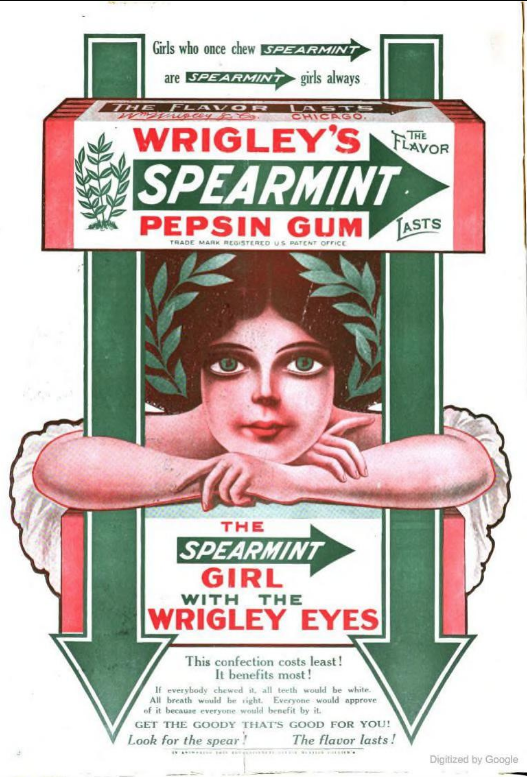
"Our gum will alter your irises!"
Source.
Posted By: Paul - Fri Oct 16, 2020 -
Comments (5)
Category: Body Modifications, Business, Advertising, Junk Food, 1910s, Eyes and Vision
Baby, the Seeing-Eye Cat
1946: Carolyn Swanson of Hermosa Beach, California made headlines on account of Baby, her "seeing-eye cat." Somehow she had trained him to assist her as she walked around town.— The Redondo Reflex - Dec 13, 1946
More info: life



Brattleboro Reformer - Dec 17, 1946
Posted By: Alex - Mon Oct 05, 2020 -
Comments (2)
Category: Cats, 1940s, Eyes and Vision
Unconsented-to Staring Contest
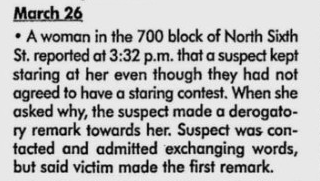
Source.
Posted By: Paul - Mon Apr 13, 2020 -
Comments (3)
Category: Annoying Things, Antisocial Activities, Awards, Prizes, Competitions and Contests, 2000s, Eyes and Vision
Regained sight after fall
Another case of an improbable cure.Eugene W. Phillips, 60, had been blind for 16 years. Then, in August 1972, he fell off his back porch, puncturing his back with a stick and hitting his head on the ground. But he also partially regained sight in one eye. His doctor concluded that the fall had jarred loose a membrane that had been covering the optic nerve.

Bonham Daily Favorite - Aug 8, 1972
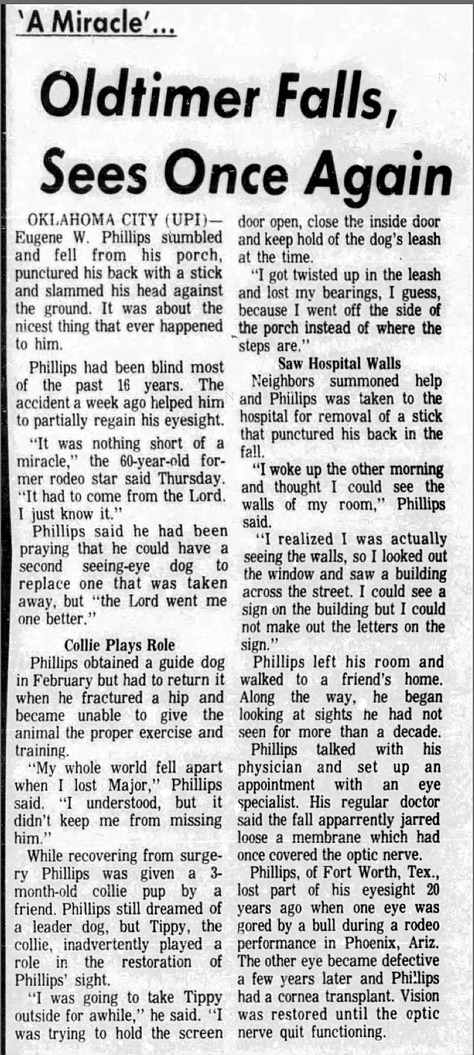
Provo Daily Herald - Aug 9, 1972
Related:
Posted By: Alex - Mon Mar 30, 2020 -
Comments (0)
Category: Health, 1970s, Eyes and Vision

| Who We Are |
|---|
| Alex Boese Alex is the creator and curator of the Museum of Hoaxes. He's also the author of various weird, non-fiction, science-themed books such as Elephants on Acid and Psychedelic Apes. Paul Di Filippo Paul has been paid to put weird ideas into fictional form for over thirty years, in his career as a noted science fiction writer. He has recently begun blogging on many curious topics with three fellow writers at The Inferior 4+1. Contact Us |




